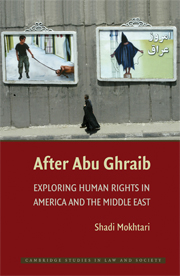Book contents
- Frontmatter
- Contents
- Acknowledgments
- Abbreviations
- Introduction
- ONE American Imaginings of Human Rights and the Middle East
- TWO The Human Rights Challenge from Within
- THREE The Middle Eastern Gaze on American Human Rights Commitments
- FOUR American Imprints and the Middle East's New Human Rights Landscape
- FIVE From the Ashes of the Post–September 11th Era: Lessons for the Human Rights Project
- Conclusion
- Bibliography
- Index
- CAMBRIDGE STUDIES IN LAW AND SOCIETY
- References
FIVE - From the Ashes of the Post–September 11th Era: Lessons for the Human Rights Project
Published online by Cambridge University Press: 12 September 2009
- Frontmatter
- Contents
- Acknowledgments
- Abbreviations
- Introduction
- ONE American Imaginings of Human Rights and the Middle East
- TWO The Human Rights Challenge from Within
- THREE The Middle Eastern Gaze on American Human Rights Commitments
- FOUR American Imprints and the Middle East's New Human Rights Landscape
- FIVE From the Ashes of the Post–September 11th Era: Lessons for the Human Rights Project
- Conclusion
- Bibliography
- Index
- CAMBRIDGE STUDIES IN LAW AND SOCIETY
- References
Summary
In the post–September 11th era, the international human rights project has been faced with formidable challenges, arguably even crises. Although linkages between human rights and hegemonic discourses can hardly be considered unique to this era, their manifestations have rarely been so transparent and centrally positioned in global affairs. Middle Eastern governments' violations of a full array of internationally recognized rights persist. American violations have included torture, egregious denials of due process, and, even more troubling the suffering and denials of human dignity stemming from war that often do not even appear on global human rights radars.
Despite these concerning trends, developments since September 11th demonstrate that power dynamics can hardly be reduced to a simple one-dimensional calculus of domination and resistance. They can also be subverted and entrapped by their own confines. Accordingly, the post–September 11th era has also seen Arabs and Muslims returning the human rights gaze after Abu Ghraib, a Yemeni human rights nongovernmental organization (NGO) calling on the U.S. Supreme Court to restore American adherence to the rule of law, Americans seeking refuge in relativism and Middle Easterners seeking refuge in universalism, and both societies engaging with human rights in new and unprecedented ways. Perhaps more importantly, it has provided key lessons for rights advocates about how emancipatory and hegemonic human rights currents are intertwined and revealed the need for the interrogation of old assumptions and strategies.
- Type
- Chapter
- Information
- After Abu GhraibExploring Human Rights in America and the Middle East, pp. 200 - 236Publisher: Cambridge University PressPrint publication year: 2009



